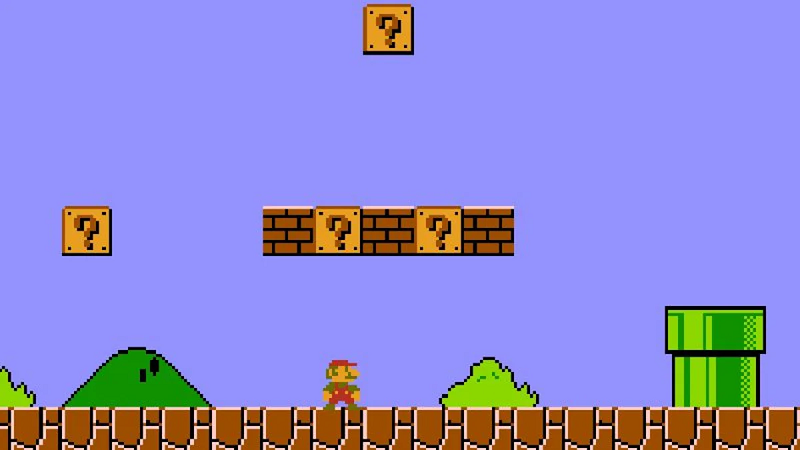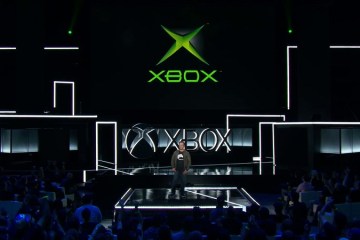
The rush of storming the lair of evil doers, the crescendo of enacting that perfect heist, the emotional loss of a beloved character, through it all we take in the breathtaking graphics, admire the impeccable lighting, and enjoy the tight controls that engage us with the latest masterpiece of gaming. But there is one character that is often sitting outside of the limelight, content with being the unsung catalyst that truly drives home the experience. It’s rarely the focal point for our gaming discussions these days, but that often under-appreciated hero is, of course, music.
Once upon a time, the landscape of video game music looked quite different. At the genesis of video gaming, music was nothing more than an atmospheric thumping, or a sort of white noise for the sake of having something going on in the background. Asteroids, Berzerk, Space Invaders, and many other games attest to this as their “music” sounded like rusted engines puttering out archaic digital mix tapes. But the presence of some form of sound was included in these games to keep the interest of players.

Even though the sounds were primitive, game designers realized something important. They needed some form of music to maintain our interest. It’s the reason various orchestrations play during pivotal movie scenes, why we hear music playing in stores, and why we turn on our radios or musical devices while driving: music helps to hold our interest and engage us in our myriad aspects of life. With entertainment, musical pieces can be used to manipulate the emotions of those watching the movie, or attending the theatrical production. The music will be upbeat during exciting encounters, whimsical during comedic sequences, and somber during heartbreaking moments. Early video game designers knew they needed something playing in the background of their entertainment, and it didn’t take long for developers to realize they could use that music to manipulate their own audience as well.
As game developers gained access to more technological power and resources in the 8-bit era, they began to hire composers to score their games. Though the music still had many limitations, many of those early tunes were so catchy and memorable that we remember them just as well, if not more, than the games themselves. If you mention Super Mario Bros. to nearly any gamer, their first thought isn’t likely to be the level design, the characters, or the gameplay, though all were fantastic. No, their first thought is likely to be what probably popped into your own head. That tune was integral to the success of the game, though when gamers talk in modern times about what was so great about Super Mario Bros., they tend to discuss the level design, characters, and gameplay, utilizing the music as a sort of soundtrack in their heads for their discussion. The music was a constant companion during our journey to save the princess, but can often be relegated to “also, the music was catchy” status regarding its importance. Without the music, the game would still likely have been successful, but it would have felt empty. Conversely, if it was scored with terrible music, the game could have actually failed.

Gamers were quick to notice the important role that music played in games during that period. Many gaming magazines included music, or music and sound, as one of the key aspects in their overall review of a game. One of the first things gamers noticed in those games was the musical tracks across the various stages and levels in every game they played. Just like with the previous example, if you bring up Journey to Silius, Batman, Blaster Master, Duck Tales, Mega Man (pick your number), or nearly any game from that period to someone that played them, there are specific melodies that will likely play fondly in their minds the moment they hear the name. The music wasn’t regarded as simple ambiance, but was one of the major factors leading gamers to purchase a game.
The 16-bit era further solidified the investment in quality music. Though companies like Sunsoft created their own technologies to pull every ounce of potential from the 8-bit systems, the 16-bit era allowed for much higher sound fidelity with full orchestral arrangements. Game companies routinely employed composers that were either already well respected or that would go on to gain a massive following throughout the gaming world. Artists like Yuzo Koshiro, Koji Kondo, and Nobuo Uematsu brought great excitement and attention to games at the mention of their involvement. The soundtracks to games such as Actraiser and Secret of Mana were so popular that they were published for purchase and were quite successful in that venture alone. When gamers played Sonic the Hedgehog or Revenge of Shinobi, they looked forward to the music of each level as much as any other component of the stage. Even today, symphony concerts are held to play series favorite tracks from The Legend of Zelda, Streets of Rage, Final Fantasy, and so many others.
The Main Theme to Final Fantasy is Considered an All-Time Classic
With games pushing ahead, beyond the eras of 32-bit and 64-bit, however, something started to happen. As technology in video games became more and more capable for music, video game designers began to take a greater inspiration from the movie industry. Music that was used to drive forward a gaming experience was traded for music that settled in the background, providing more atmospheric tracks of ambiance than hummable melodies. Developers seemed to be content with tunes that helped add to the mood, but steered away from the driving melodies that could be a risk to the project if the music wasn’t well received.
Another trend also began to show up: licensed music. Game developers no longer needed to create their own music from scratch. Sure, older games such as The Goonies II, Back to the Future, and even E.T., had low fidelity versions of licensed music, but games could now utilize the actual licensed songs from various artists. Many developers took that idea and rode with it, with licensed tracks powering the soundtrack to Gran Turismo, Grand Theft Auto (III and up), Tony Hawk’s Pro Skater, Crazy Taxi, and the like. Due to difficulties with licensing issues and the high cost, however, licensed music tended to be used more sparingly in games as time went on.

Though the use of licensed music isn’t as prevalent as it once was, the trend of keeping music more atmospheric has stayed. As such, the importance of music in games may not be as fully realized to newer gamers. They hear the music, but may not consider how much it is actually adding to the experience. I’m sure most would prefer some music to play during their playing time, but I’m not sure many would state that music is absolutely integral to the core gaming experience. It’s a different perspective based on a different era of game development.
The philosophy of scoring games is much different in modern times because the games are designed much differently. Back when games existed in the span of about six to eight tight and dedicated stages of play, each of which was usually fairly short, it made sense to have an appealing track for each level. With games being designed to be much more grandiose and open-ended, the sound and music design was re-imagined. Since the scope of games is much larger, and players often can go anywhere, whenever they want, the music must follow them. But which tracks would follow, and what kind of music would it be? Without short stages of play, players could tire of hearing the same rousing melody repeated ad nauseam while they explored every nook and cranny of a world. As such, musical tracks were utilized to help build the atmosphere of the game, in much of the same vein as the graphics, lighting, and effects employed in the game. It is designed to absorb the player into the world, but not to thrill them with powerful melodies.
Does this make the music any less important, though? Let’s do a little experiment. First, think of some recent games that you’ve played. Get about four or five of them in your head. Hum a few tunes from each of their soundtracks from memory. Now, think of some classic games that you loved, from the 8-bit and 16-bit days. I’ll bet most of us can remember many more tracks from those older games than we can from recent games. For every Halo and Elder Scrolls game that has more memorable tunes, there are countless others that may only have a memorable tune at the title screen.

It doesn’t mean the music is less important, however. So what was the point of that experiment? Imagine all of the games you just did before, past and present. Imagine if there was absolutely no music in any of them, whatsoever. Would they still be playable? Sure they would. But would they be as enjoyable? It just wouldn’t be the same. Sure, there may be the odd game that has such a horrible soundtrack that you just want to mute it, but those are the outliers. Games with terrible musical scores, such as Sonic Chronicles: the Dark Brotherhood, tend not go on to the success and fame as other games. Game companies understand the importance of music in their games. As such, most games have music that is given much thought, and is fitting to the game’s environment. Whether the music is hummable, atmospheric, melodic, or eccentric, we need it as a part of the core gaming experience.
Just as there are many genres of games, there are many types and uses of music in them. But the need for music is prevalent; without music, a game would be missing its heart. Music is integral to the way people experience entertainment, and the gaming industry is fully aware of that. We get to enjoy the rousing scores found in the Divinity games, and the percussive syncopation and eclectic experimentation found in the Borderlands. We hum Mario’s music as a sort of icebreaker with our fellow gamers, and we sing the praises of the Halo soundtrack as a distinct part of our memories. What would Bloodborne be without its haunting dissonance? What would Forza Horizon be without its electro dance? They would be playable, certainly, but they would be hollow. They would be missing their soul as a gaming experience, and therein lies the importance of music, in every game, and every medium. Music is the heart and soul of it all, there with us through all of the joy and all of the pain. And what a welcome companion it is.



Thank you Patrick! That was a great read and really well written! Look forward to reading more of your articles!
Thank you for stopping by Seasoned Gaming and checking it out! I’m passionate about music, and it was a pleasure to write this up. I’m glad you liked it!
[…] but it too frequently gets disregarded in favor of other factors, such as graphics or storyline. Music is part of the overall gaming experience, however. Music can have an effect on the emotions of an audience and help to shape the tone of the […]
[…] https://seasonedgaming.com/2020/05/26/the-importance-of-music-in-video-games/ […]